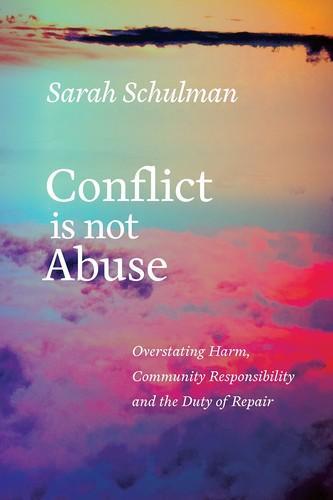ralentina reviewed Conflict is not abuse by Sarah Schulman
Conflict is not abuse
5 stars
Gist (no major spoilers): in many situations, from the personal scale of relationship to geopolitics, people tend to react to perceived abuses through group shunning. We experience discomfort, pain or fear, identify a culprit, and direct punishment at them, which often involves a refusal to talk. This dynamic is often fueled by traumatic experiences or a sense of Supremacy: the two are remarkably similar, and often coexist in the same person. Our reaction is enabled by people who belong to the same group as us, being a family, a social group or a nation, who ‘take our side’ and help to implement punishment. But what if many of these situations where not instances of abuse, but simply conflict, which can only be resolved through open confrontation? This would require us to engage in many uncomfortable conversations, being honest and ‘rigorous’ with our friends and family members even at the risk …
Gist (no major spoilers): in many situations, from the personal scale of relationship to geopolitics, people tend to react to perceived abuses through group shunning. We experience discomfort, pain or fear, identify a culprit, and direct punishment at them, which often involves a refusal to talk. This dynamic is often fueled by traumatic experiences or a sense of Supremacy: the two are remarkably similar, and often coexist in the same person. Our reaction is enabled by people who belong to the same group as us, being a family, a social group or a nation, who ‘take our side’ and help to implement punishment. But what if many of these situations where not instances of abuse, but simply conflict, which can only be resolved through open confrontation? This would require us to engage in many uncomfortable conversations, being honest and ‘rigorous’ with our friends and family members even at the risk of upsetting or even losing them (being a bystander is one of the worst things one can do), and confront our own feeling of righteousness and superiority. It probably wouldn’t ‘feel good’, but it’s the way to get better.
Some thoughts: Schulman opens the book by asking readers to approach the book like a theatre piece: something to engage with rather than agree or disagree with. This is very helpful advice, and perhaps something to apply to many more books. I thought of it often while reading, trying to delay judgement and instead focusing on understanding what she wanted to say. I did not think I would like the chapters about personal relationships, I suppose because I feel almost scared to entertain the thought that perceived abusers deserve being heard. But when you spell it out like that, doesn’t it sound very reasonable? And isn’t it true that most people are at some points both victims and perpetrators, at various scales, and that by isolating them unconditionally we don’t give them a chance to heal? From there, Schulman makes an argument about avoiding to involve the state unless someone is in danger, linking this to a critique of the heteronormative family. Again, this seem eminently reasonable, although I think I have a slightly less negative view of family, as long as we don’t see genetics as a condition for family ties. In later chapters, Schulman expands her argument to racial politics and Israel/Palestine. She sets it up by sharing her admiration for (Jewish) psychoanalysts who left Germany as refugees, and then devoted their career to understanding Nazi behaviours, and dreamt of treating their oppressors. Put it like that, it's a crazy thought, and, indeed an extreme case of refusing shunning in favour of understanding. At the same time, I always find it difficult to apply psychology to structural groups – let’s say, White people, or Israelis. Not because I don’t think it plays a role, but because it seems to me that most people have a genuine desire to abide by some moral standard, and be ‘decent’, however their define that. But to what extent can one expect this kind of concerns to guide group behaviour?

